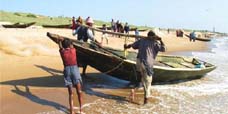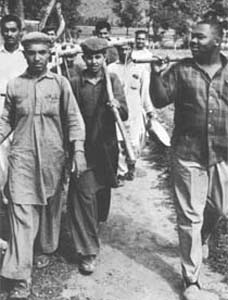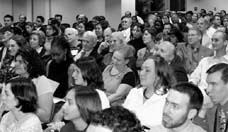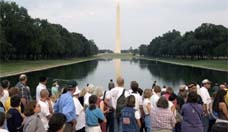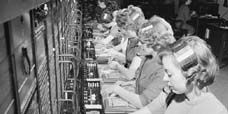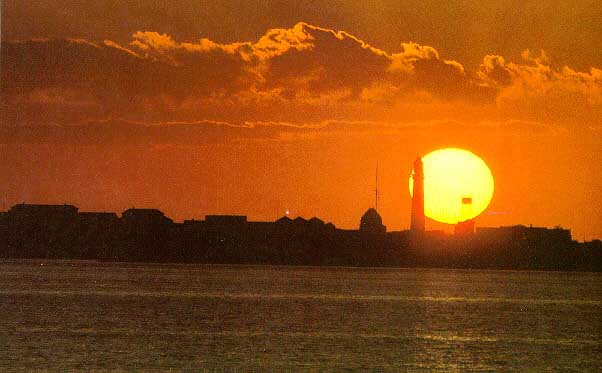
RPCV James Rupert says: As the U.S. is looking to win people over in the Muslim world, security fears prompt the closing of an American cultural center in Islamabad
Outreach from inside the wall
As the U.S. is looking to win people over in the Muslim world, security fears prompt the closing of an American cultural center in Islamabad
BY JAMES RUPERT
STAFF CORRESPONDENT
March 28, 2005
ISLAMABAD, Pakistan -- Hamid Alvi agrees with Secretary of State Condoleezza Rice, with the 9/11 Commission and with dozens of U.S. think tanks, books and government reports that say America must dramatically energize its "public diplomacy" to win the hearts and minds of people in the Muslim world. So this month, as Alvi gazed at the flagship of that effort in Pakistan - the big, modern, American cultural center on the main boulevard of the capital - he couldn't figure out why the U.S. government is shutting it down.
In the city that rules the world's third-largest Muslim population, the closure of the center this spring underscores how security worries limit - and often trump - U.S. efforts to build a dialogue with Muslim peoples. The American Center - with its library, auditorium and art gallery, and the U.S. Embassy's Public Affairs Office - was effectively the headquarters for Washington's effort to deliver its message to Pakistan's people and to hear their reactions. But the State Department determined that the center can't be defended against a terrorist attack and has abandoned it, withdrawing its public affairs specialists to the embassy, a brick fortress isolated deep within Islamabad's guarded diplomatic enclave.
"If there are any terrorist groups in Islamabad, they are going to have a big party when they hear this news," said Alvi, who worked on the embassy public affairs staff for 26 years.
With millions of Muslims around the world half-convinced by militant arguments that the United States has launched a global war on the Islamic religion and Muslim cultures, U.S. officials in Washington say Pakistan is a critical target of America's campaign to rebut that stereotype.
America's spending for public diplomacy, which it slashed after the Cold War, has rebounded. Much of the new money is going to expand visits for foreigners to study or train in the United States. And the State Department is trying new techniques to address foreign peoples without actually having its diplomats meet them. It is using local citizens as its representatives and adding radio and TV broadcasts and Web sites run by the U.S. government.
But Washington's new buzz about public diplomacy is not yielding any increase in direct contact between American diplomats and Pakistanis, said Alvi, 72, who is now a political columnist and lecturer. Pakistani intellectuals and U.S. officials interviewed in recent months agree.
America has five diplomats in Pakistan assigned to public affairs, down from 10 in 1998. "Their public affairs activity has shrunk to ever-tighter circles" and these days engages few Pakistanis outside the narrow elite holding power under the military ruler, President Pervez Musharraf, said Ayaz Amir, a columnist for Dawn, Pakistan's biggest English-language newspaper.
In Pakistan, the symbol of a U.S. retreat in public affairs is the closure of the American Center on Jinnah Avenue, Alvi and others said. In a city where most still lack access to a library, the center has held a prime spot - close to Pakistan's presidency, parliament and other power bases - from which to offer books, films, art and debate.
There is a lot to Pakistan that tends to cut its people off from an open-minded view of the outside world: widespread poverty, illiteracy, conservative tribal traditions, militant Islamist movements and military rule.
For years, the American Centers in Islamabad, Lahore, Karachi and Peshawar were magnets for students, teachers, reporters and politicians. For Amir, one of Pakistan's most prominent political commentators, "it was at the American Center that I read my first H.L. Mencken and got my first look at the New York Review of Books."
Following the postwar budget cuts in the 1990s and the more recent terrorism worries, all the American centers in Pakistan are closed. "To do public affairs work has become harder and harder because you're constantly up against a security officer," said Kent Obee, a retired diplomat who was the Islamabad embassy's public affairs officer in the mid-1980s.
In Washington and in embassies, the State Department's security officials and public affairs specialists duel daily over how far to restrict U.S. diplomats' activities to make them safer. The issue is acute in Pakistan. Since 2002, violent Islamic militants have struck repeatedly in Karachi, killing Wall Street Journal reporter Daniel Pearl, bombing the U.S. Consulate and, last year, attacking an English-language school that called itself the Pakistan-American Cultural Center.
The U.S. Embassy was especially shaken in 2002, when militants detonated grenades at a church in Islamabad's diplomatic enclave, not far from the embassy, killing an American embassy employee, her daughter and three others. The State Department formally warns Americans not to visit and forbids its diplomats serving here from bringing family members with them. So most U.S. diplomats here serve for only one year.
"Most of them barely learn their way around before they go home," said a State Department official in Washington. "The embassy keeps no institutional memory and is constantly relearning things. In the long run, we can't run a very effective mission that way."
Diplomats here privately agree but say they're not supposed to be quoted about it.
State Department security officials voice annoyance at some of the complaints. "We're trying to keep everyone safe," one said. "Even those dumb enough to think that everyone in Islamabad is their friend."
Alvi said he understood the security officers' worries. As a public affairs specialist with the U.S. Information Agency, he saw mob assaults on the U.S. Embassy and other centers. After each attack, "it required some courage to keep ... [the centers] running, to fight it out." But now, he said, "fear is winning."
Of the State Department's new public affairs efforts, one widely praised so far is the creation of "American corners." Unlike the larger, more elaborate American centers, which were run by U.S. diplomats, American corners are staffed by local citizens, equipped with small collections of reference books and computer resources and located in government buildings or universities. Four American corners are planned for Pakistan and "we strongly believe that they can provide important platforms for outreach by U.S. diplomats," said a State Department official with responsibility for South Asia.
At the same time, the withdrawal of America's public affairs diplomats from Islamabad's main avenue is cutting back their contact with locals. Few Pakistanis are expected to run the obstacle course necessary to reach the diplomats' new office at the embassy.
Ordinary visitors must report to a sunbaked parking lot, check their cell phones and any other electronic devices at a trailer, be searched, buy a ticket on a shuttle bus, wait in line and finally ride into the diplomatic enclave for more searches and formalities at the embassy gate. On a busy day, the process can take hours.
"Long-term human contact is the most important thing," said Alvi. "With human contact, a revolution takes place in the mind," breaking the stereotypes that now poison dialogue between most Americans and Muslims.
"Only after that can you deliver your message. Unless somebody trusts you, he will never believe your words," he said. "And only personal contact builds that kind of credibility."







